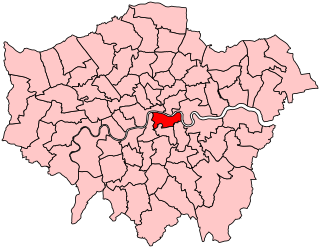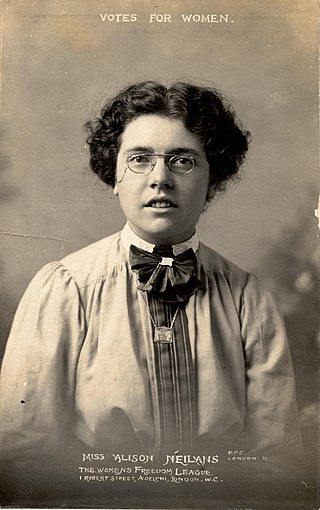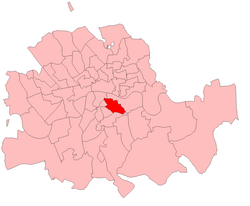
North Southwark and Bermondsey was a parliamentary constituency which returned one Member of Parliament (MP) to the House of Commons of the Parliament of the United Kingdom. The constituency was created for the 1997 general election.

A by-election was held in the Bermondsey constituency in South London, on 24 February 1983, following the resignation of Labour MP Bob Mellish. Peter Tatchell stood as the candidate for the Labour Party, and Simon Hughes stood for the Liberal Party. Following a bitter campaign, the Liberals made huge gains and took the seat, with a majority of votes cast. Labour's vote fell from 63.6 per cent in May 1979 to 26.1 per cent as Tatchell came a distant second, while the Conservative candidate, Robert Hughes, managed only fourth place, losing his deposit. With a swing of 44.2%, the 1983 Bermondsey by-election remains the largest by-election swing in British political history.
Southwark and Bermondsey was an inner city constituency in London, United Kingdom. Its sole Member of Parliament was Simon Hughes, in the first stage of his career in the house, as a Liberal then Liberal Democrat after the party's founding in 1988. It was replaced with the North Southwark and Bermondsey seat in 1997.

Alfred Salter was a British medical practitioner and Labour Party politician.

The 1912 Bow and Bromley by-election was a by-election held on 26 November 1912 for the British House of Commons constituency of Bow and Bromley. It was triggered when the Labour Party Member of Parliament (MP), George Lansbury, accepted the post of Steward of the Chiltern Hundreds as a technical measure enabling him to leave Parliament.
John Molesworth Thomas Dumphreys was a British Conservative politician. He was elected Member of Parliament for Bermondsey in a 1909 by-election, but weeks later lost the seat to the Liberals at the January 1910 general election.

Alison Roberta Noble Neilans was an English suffragette. Neilans was a member of the executive committee of the Women's Freedom League, a member of the Church League for Women's Suffrage and the East London Federation of Suffragettes, where she worked with Sylvia Pankhurst. She was also a member of the board of the International Woman Suffrage Alliance.

Harold James Glanville was an English businessman and Liberal Party politician.

George Joseph Cooper was a British Liberal Party politician in London.
The 1908 Leeds South by-election was a parliamentary by-election for the House of Commons constituency of Leeds South in the West Riding of Yorkshire held on 13 February 1908.
The 1917 Islington East by-election was a parliamentary by-election for the British House of Commons constituency of Islington East held on 23 October 1917.
There was a parliamentary by-election for the House of Commons constituency of Leith, which took place on Wednesday, 23 March 1927.
The 1937 North Dorset by-election was a parliamentary by-election for the British House of Commons constituency of North Dorset on 13 July 1937.

Spencer Leigh Hughes was a British engineer, journalist, and Liberal politician.

The Social Democratic Party (SDP) was a centrist to centre-left political party in the United Kingdom. The party supported a mixed economy, electoral reform, European integration and a decentralised state while rejecting the possibility of trade unions being overly influential within the industrial sphere. The SDP officially advocated social democracy, but its actual propensity is evaluated as close to social liberalism.
The 1933 Ashford by-election was a parliamentary by-election for the British House of Commons constituency of Ashford on 17 March 1933.
The North West Staffordshire by-election was a Parliamentary by-election held on 31 July 1907. The constituency returned one Member of Parliament (MP) to the House of Commons of the United Kingdom, elected by the first past the post voting system.
The 1907 Jarrow by-election was held on 4 July 1907.
The 1906 Huddersfield by-election was a Parliamentary by-election held on 28 November 1906. The constituency returned one Member of Parliament (MP) to the House of Commons of the United Kingdom, elected by the first past the post voting system.

On 1 December 2016, a by-election was held in the UK parliamentary constituency of Richmond Park. It was triggered by the resignation of the Conservative Member of Parliament Zac Goldsmith on 25 October 2016 over the Government's proposal for a third runway at the nearby Heathrow Airport. It was won by Sarah Olney of the Liberal Democrats, after a campaign focused on opposition to Brexit.














